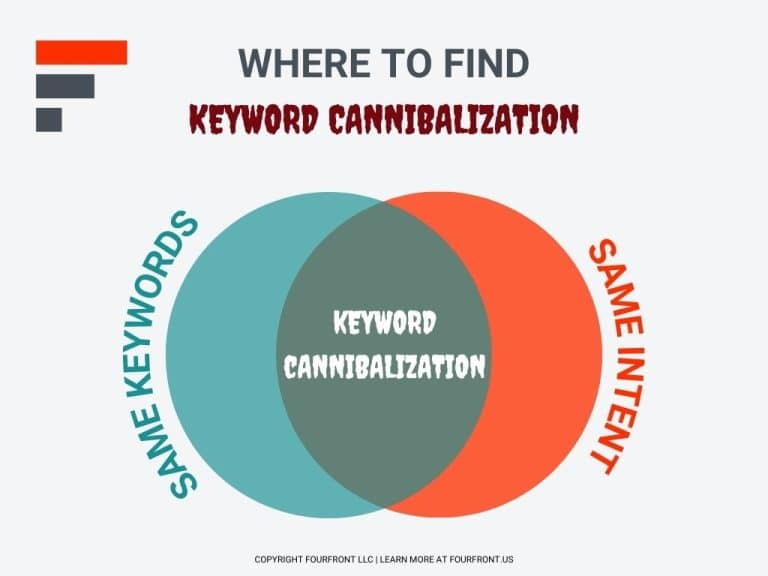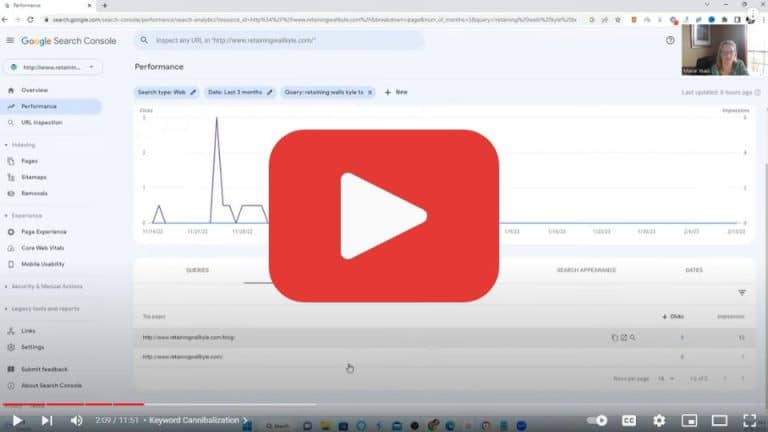Keyword cannibalization might seem intimidating (or even a little horrific – SEOs love dramatic names for things), but it’s a super important concept to understand for anyone aiming to boost their website’s SEO.
Keyword cannibalization occurs when several pages on your website chase after the same keyword, unintentionally competing against each other. This friendly fire can drag down your site’s search rankings for those keywords, making your website harder to find on search engines like Google. Resolving keyword cannibalization is crucial for making sure each page on your site has its moment to shine and reaches the right audience.
This guide will walk you through strategies to pinpoint, resolve, and dodge keyword cannibalization, helping to elevate your site’s visibility, authority on search engines, and user experience.
What is Keyword Cannibalization?
Keyword cannibalization occurs when two or more pages on the same website target the same search term, competing against each other in search engine rankings. This internal competition can dilute the effectiveness of each page to rank well, negatively impacting the website’s overall SEO strategy.
When multiple pages of your website vie for the same keywords, it’s not just about the confusion it creates for search engines in determining which page to rank for a given search query. This scenario also spreads out the potential authority and link equity among multiple pages rather than concentrating it on one authoritative page, leading to weaker search visibility overall.
Common scenarios where keyword cannibalization happens include:
- Blog posts covering similar topics with slight variations but targeting the same keywords.
- Product pages with similar items or variations that use the same keywords for their SEO.
- Content across different categories that inadvertently target the same keywords due to overlap in topic or product features.

Dilution of Page Authority
When multiple pages target the same keyword, search engines struggle to identify which page is the most relevant for that query.
Instead of consolidating the authority and relevance of a single page, the authority is spread thin across multiple pages. This dilution means that none of the competing pages may rank as highly as they could if they were the sole focus for that keyword. In essence, rather than having one strong page that commands attention and authority, a website ends up with several weaker ones.
Impact on Rankings
Keyword cannibalization directly undermines a page’s ability to rank prominently in search engine results.
When search engines are presented with multiple pages from the same site targeting identical keywords, they’re forced to choose which page is most relevant for a given query. This competition within your own site can prevent any single page from standing out, leading to lower rankings for all involved pages.
Instead of consolidating ranking power in one comprehensive, authoritative page, the effort is split among several, resulting in none achieving the visibility they potentially could. This scattering of focus can lead to suboptimal rankings across the board, reducing the overall effectiveness of your site’s SEO strategy.
Division of Link Equity
Each page on a website has the potential to earn link equity (the value passed through hyperlinks from other websites). When you have multiple pages competing for the same keywords, the external links pointing to your site might not be directed to the most relevant or authoritative page.
For instance, if two pages on your site target the keyword “best digital cameras,” and both receive backlinks, the link equity those pages receive is not as powerful as it would be if all backlinks pointed to a single, consolidated page on the subject. This division not only affects rankings but also the overall strength and authority of your site in the eyes of search engines.
Potential for User Confusion
Beyond the technical SEO implications, keyword cannibalization can lead to a poor user experience.
When visitors encounter multiple pages with similar content and focus, it can be confusing and frustrating. Users may find it difficult to determine which page best answers their query, leading to increased bounce rates and decreased engagement. These behavioral signals can further inform search engines that your content may not be the most relevant or useful, negatively impacting your rankings.
Is Keyword Cannibalization Bad?
As with many SEO questions, the answer here is “that depends.”
Targeting the same keyword or topic with multiple pages is not inherently bad, especially when those pages serve different purposes or search intents. But if you get to the point where those pages are actively “cannibalizing” each other, confusing users and search engines, and watering down the topical authority of your site, then yes – that’s bad.
Keyword cannibalization is also not as much of an issue as it used to be. Search engines are getting smarter and are better able to distinguish the nuances in related content. However, it can still impact your site negatively if not managed properly.
When It's a Problem
- Direct Competition: If pages target the same keyword without clear differentiation, they compete for rankings, potentially harming visibility.
- Dilution of Authority: Splitting backlinks among similar pages weakens their SEO strength.
- User Confusion: Similar pages for the same query can frustrate users, affecting engagement and bounce rates.
When It's Less Concerning
- Different Intent: Pages targeting similar keywords but designed for different intents (e.g., informational vs. transactional) are less likely to be negatively affected.
- Content Depth: Covering a topic in depth across multiple pages, each with a unique angle, can be beneficial.
Despite Google’s smarter algorithms making keyword cannibalization less of an issue, it’s still important to address it when discovered to avoid potential negative impacts on your site’s SEO.
How to Identify Keyword Cannibalization
The first step to fixing keyword cannibalization on your site is finding it. There are many powerful (and expen$ive) SEO tools out there that have customized reports for identifying potential instances of keyword cannibalization. Some popular ones include:
- Ahrefs’ Site Explorer tool » “Organic Keywords” report » toggle on “Multiple URLs Only”
- Semrush’s Position Tracking Tool » Cannibalization Report
However, in the name of making good SEO more accessible, I’m going to give you the tried and true, free way to identify potential keyword cannibalization on your site using Google Search Console:
- Performance Report:
- Log into Google Search Console and navigate to the ‘Performance’ report.
- Set the date range to the past 3-6 months for comprehensive data.
- Queries Analysis:
- Look at the ‘Queries’ tab to see the keywords your site appears for in search results.
- Click on a search query your site is being impressed for. I recommend starting with your most important keywords, or any keyword you suspect might be being cannibalized.
- Page Filter:
- Use the ‘Pages’ filter to see which specific pages are ranking for the same keyword.
- Note the URLs of pages that appear for identical queries.
- Manual Review:
- Evaluate the content of these pages to determine if they genuinely target the same keyword with similar intent or if their targeting is justifiably different.
The first ~2:30 of this video walk you through those steps, in case you’re more of a visual learner, or are new to navigating Google Search Console:
3 Proven Ways to Fix Keyword Cannibalization
Keyword cannibalization can dilute your SEO efforts, but with the right strategies, you can turn things around. Here are three proven methods to tackle and fix keyword cannibalization on your website:
1. Consolidate and Redirect Content
When you discover multiple pages competing for the same keywords, consider merging this similar content into a single, comprehensive page. This consolidation process not only eliminates internal competition but also creates a stronger, more authoritative source for your target keywords.
Once consolidation is complete, use 301 redirects from the old pages to the new, unified page. This ensures that any link equity the original pages had is transferred to the consolidated page, boosting its ranking potential, and providing a clear path for both users and search engines.
2. Strengthen Your Internal Linking
A well-planned internal linking structure is crucial for guiding both visitors and search engines through your site’s content effectively.
By carefully selecting which pages to link to and using relevant anchor text, you can signal to search engines the hierarchy of content on your site and which pages are most important. This helps distribute page authority more evenly and reduces keyword cannibalization by making it clear which page should rank for a specific keyword. Moreover, strategic internal linking improves site navigation, enhancing the overall user experience and contributing positively to SEO.
3. Refine Content for Clear Search Intent
Aligning your content with specific search intents (navigational, informational, commercial, or transactional) is another effective way to address keyword cannibalization.
Review your content to ensure each page targets a distinct aspect of a broader topic or different user intent. This might involve modifying the content to more clearly address questions, needs, or stages in the buyer’s journey that are unique to each page. By doing so, you make it easier for search engines to understand the purpose of each page and rank it for the most appropriate queries, reducing the likelihood of your pages competing against each other for rankings.
Keyword Cannibalization “Fixes” to (Usually) Avoid
Keyword cannibalization is one of those old SEO problems that has been around as long as SEO itself, and so it has had many waves of best practices for solving it. Unfortunately, a lot of that old and not-so-great-anymore advice is still floating around out there in the SEO Tips space.
Some of these fixes still work well in very specific, and uncommon, situations. Others are just plain bad advice.
Using Canonical Tags
Canonical tags are often suggested as a remedy for various SEO challenges, including keyword cannibalization. However, they are not a one-size-fits-all solution, especially in the context of keyword cannibalization.
The primary purpose of a canonical tag is to tell search engines that certain similar pages are duplicates or near-duplicates, and to indicate which version of the content you prefer to be indexed. This helps to avoid duplicate content issues, ensuring that the SEO value (like backlinks and content authority) is attributed to the page you designate as the canonical version.
It’s also important to note that the canonical tag is taken as a hint and is not a hard directive. In other words: even with a proper canonical tag, Google may not honor that request the way you intend.
Noindexing
Using noindex tags as a solution for keyword cannibalization has fallen out of favor because it prevents search engines from indexing the tagged pages altogether, potentially removing valuable content from search results. It also means losing any built-up page authority signals from the noindexed page, as the noindex tag effectively “deletes” the page from search results.
This approach doesn’t solve the underlying issue of multiple pages competing for the same keywords, but rather eliminates the chance for some of those pages to rank and attract traffic at all. It’s a blunt instrument that can harm your site’s overall visibility and forfeit opportunities to engage different user intents or search queries.
Deleting Content
Deleting content to fix keyword cannibalization is rarely the best solution, except in specific circumstances where the content in question offers no value to your business or website, or if it ranks solely for the cannibalized keyword without contributing to your site’s overall SEO goals. In such cases, removal might be justified.
De-Optimizing Content
I’ll be the first to say this is a tactic I used to use and recommend, myself. However, the more I have learned about SEO, the less it actually makes any sense.
Trying to fix keyword cannibalization by de-optimizing content—like removing specific keywords or tweaking internal links—might seem like a straightforward fix, but it’s not that simple. The issue is, you can’t just target one keyword without impacting the rest.
If you pull out internal links or keyword mentions hoping to solve cannibalization, you risk dropping your page’s rankings for other, related keywords too. Everything on your page is interconnected, so such changes can unintentionally harm your overall SEO performance.
Prevent Future Cannibalization
To ensure your website continues to grow in visibility without the setback of keyword cannibalization, refining your keyword strategy is a must. A proactive approach to keyword selection and content planning can help you avoid unnecessary overlap and competition within your site. Here’s how to refine your keyword strategies effectively:
Semantic Search Optimization
Embrace the complexity of semantic search by optimizing for topics, not just keywords.
Google’s algorithms have evolved to understand the context and intent behind search queries, not just the exact phrases.
Develop content that covers a topic comprehensively, using related terms, synonyms, and contextually relevant phrases. This broadens your content’s appeal to a variety of search queries related to your main topic, reducing the risk of cannibalization by ensuring each piece of content serves a unique aspect of the topic.
User Intent Mapping
Understanding the intent behind search queries is crucial for creating content that meets users’ needs at different stages of their journey.
Break down your target keywords by intent—informational, navigational, transactional, and commercial investigation. Tailor your content to match these intents, ensuring that each page or piece of content clearly addresses a specific user need or question. This differentiation helps avoid internal competition by aligning each piece of content with distinct search intents.
Keyword Gap Analysis
Regularly perform a keyword gap analysis to identify opportunities your competitors are leveraging that you might be missing.
This analysis can also help spot potential areas of cannibalization within your own content. By identifying gaps, you can create targeted content that fills these spaces without stepping on the toes of your existing pages.
Regular Content Audits
Conduct content audits periodically to review and assess the effectiveness of your keyword strategy.
Audits can reveal instances of cannibalization, overlap, or content gaps. Use these insights to adjust your content plan, merging, refining, or expanding content as necessary to maintain a clear and effective keyword strategy.
FAQs
How do you avoid keyword cannibalization for e-commerce sites?
For e-commerce sites, avoiding keyword cannibalization involves strategic planning of product pages and categories. Ensure each product page targets unique, specific keywords related to the product itself, while category pages target broader terms. Regularly audit your site to identify and merge any duplicate content, and use breadcrumb navigation to reinforce the site hierarchy to search engines and users alike.
What is the impact of keyword cannibalization?
Keyword cannibalization can significantly dilute your SEO efforts, leading to lower rankings, decreased traffic, and lost conversion opportunities. It creates confusion for search engines trying to determine the most relevant page for a keyword, resulting in none of your pages performing as well as they could. This internal competition can also spread out link equity and authority, weakening your site’s overall SEO profile.
How do I do a keyword cannibalization audit?
To perform a keyword cannibalization audit, start by listing all the keywords each page on your site is targeting. Tools like Google Search Console or SEMRush can help you identify which keywords are driving traffic to multiple pages. Review these pages to assess their content and intent overlap. Finally, decide on actions such as merging similar content, deleting redundant pages, or re-optimizing content to clarify target keywords and intents.
What causes keyword cannibalization?
Keyword cannibalization often results from a lack of coordinated content strategy or an understanding of SEO best practices. It can occur when multiple articles or pages are created around the same topic without distinct targeting, or when product pages on e-commerce sites target similar keywords without differentiation. It can also happen as a site grows and evolves, unintentionally creating overlap in keyword targeting across new and old content.
Is it always necessary to fix keyword cannibalization?
While it’s important to address keyword cannibalization when it significantly impacts your SEO, not every instance requires drastic changes. Minor cases with little effect on your overall site performance can sometimes be monitored rather than immediately corrected. Prioritize fixes based on the severity of the cannibalization’s impact on your rankings and traffic.
How does keyword cannibalization affect paid search campaigns?
Keyword cannibalization can also impact the efficiency of paid search campaigns by causing internal competition between your own ads. If multiple ads target the same or very similar keywords, you may end up bidding against yourself, increasing costs and diluting the effectiveness of your ad spend. Carefully structuring your ad groups and keywords can help minimize this issue.
If you need help setting up your paid search campaigns for success, that’s something we can help with! Learn more about our PPC Services.
What role does site architecture play in preventing keyword cannibalization?
A well-organized site architecture helps prevent keyword cannibalization by clearly delineating the relationship and hierarchy between pages. By structuring your site in a way that logically groups related content and defines clear paths for users and search engines, you can minimize the chances of creating content that competes for the same keywords.
How often should I audit my site for keyword cannibalization?
The frequency of keyword cannibalization audits can vary depending on the size of your site and how often you produce new content. Generally, conducting an audit every 3 to 6 months is a good practice for most websites. However, if your site is particularly large or you’re actively adding content regularly, you might benefit from more frequent reviews.












